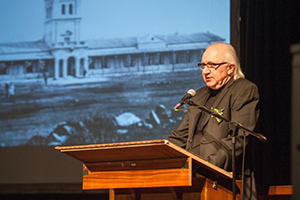
Anton Roodt
Photo: iFlair |
In a packed Civic Theatre in Bloemfontein, Anton Roodt, an alumnus from the UFS Department of Architecture, presented the 27th Sophia Gray Memorial Lecture.
Roodt received numerous awards for his work during his career. He also completed three masters degrees at the UFS, all of them cum laude.
The theme for his lecture was: Big dreams in a small city. Places of memory¦Spaces of imagination.
In his presentation, he focused mainly on President Brand Street, one of the most beautiful streets in South Africa – a gem waiting to be rediscovered, as well as Waaihoek, where many projects are planned for the future.
During his career, Roodt has been involved in various projects in these areas, including the Fourth Raadsaal, for which he received a FSIA Award in 2011. The Mapikela House in Batho is another project he was involved in.
He believes universities are small cities with a good deal of ambition. A number of infrastructure projects on the campuses of the UFS were designed by Roodt Architects. On the Bloemfontein Campus, this includes the Student Centre on the Thakaneng Bridge, the Main Gate, the Financial Planning Law Building, and the Computer Centre, as well work done on the Albert Wessels Auditorium. They also designed the dining room and the Main Entrance on the Qwaqwa Campus.
Roodt was introduced to the audience by the familiar singer and his university friend, Coenie de Villiers, with the question: “Why architecture?” He replied: “It is one of the best professions to take you to places most people will never be able to visit – sometimes literally to the feet of kings.”
Roodt believes that architects are sellers of dreams. “Dreams are the purest form of imagination. Architects dream of places as if people matter,” he said.
The Women in Architecture initiative was also launched by the South African Council for the Architectural Profession at the event. Of more than 8 800 professional architects, only 21% are women.